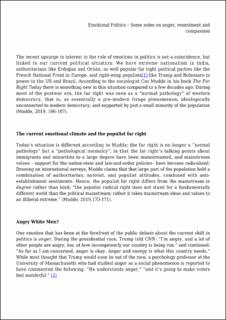| dc.contributor.author | Granberg, Anne | |
| dc.date.accessioned | 2021-05-20T08:26:19Z | |
| dc.date.available | 2021-05-20T08:26:19Z | |
| dc.date.created | 2020-11-16T18:21:37Z | |
| dc.date.issued | 2020 | |
| dc.identifier.issn | 1670-6242 | |
| dc.identifier.uri | https://hdl.handle.net/11250/2755789 | |
| dc.description.abstract | The recent upsurge in interest in the role of emotions in politics is not a coincidence, but linked to our current political situation: We have extreme nationalism in India, authoritarians like Erdoğan and Orbán, as well popular far right political parties like the French National Front in Europe, and right-wing populists[1] like Trump and Bolsonaro in power in the US and Brazil. According to the sociologist Cas Mudde in his book The Far Right Today there is something new in this situation compared to a few decades ago: During most of the postwar era, the far right was seen as a “normal pathology” of western democracy, that is, as essentially a pre-modern fringe phenomenon, ideologically unconnected to modern democracy, and supported by just a small minority of the population (Mudde, 2019, 106-107). | en_US |
| dc.language.iso | eng | en_US |
| dc.publisher | The University of Akureyri | en_US |
| dc.rights | Navngivelse-DelPåSammeVilkår 4.0 Internasjonal | * |
| dc.rights.uri | http://creativecommons.org/licenses/by-sa/4.0/deed.no | * |
| dc.title | Emotional Politics – Some notes on anger, resentment and compassion | en_US |
| dc.type | Journal article | en_US |
| dc.type | Peer reviewed | en_US |
| dc.description.version | publishedVersion | en_US |
| cristin.ispublished | true | |
| cristin.fulltext | original | |
| cristin.qualitycode | 1 | |
| dc.identifier.cristin | 1848530 | |
| dc.source.journal | Nordicum-Mediterraneum | en_US |
| dc.source.40 | 15 | |
| dc.source.14 | 2 | |
| dc.identifier.citation | Nordicum-Mediterraneum. 2020, 15(2) | en_US |
| dc.source.volume | 15 | en_US |
| dc.source.issue | 2 | en_US |

